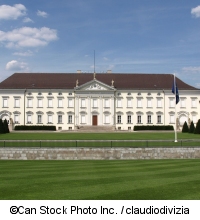The role of the President in Germany is largely ceremonial.
He or she is elected not by the people, but by the Bundesversammlung – a rather strange arrangement consisting of the members of the Bundestag (lower house), Bundesrat (upper house), as well as representatives from each state’s parliament. It is the largest political entity in Germany, currently with 1244 members. The Bundestag members make up 50% of the votes.
And since the amount of votes each party holds depends on their share of power in each of the states, the Bundesversammlung does not necessarily reflect the normal political state of the country as a whole.
When President Horst Köhler resigned on Monday, the wheels were set in motion to calculate the membership for the election of a new president by the end of June. The German constitution allows only 30 days for this to happen. Three days later, and despite modern technology those calculations continue.

Schloss Bellevue in Berlin - official residence of the German President
But why does Germany need a new president in the first place? Apparently President Köhler gave an interview last week which was – as far as I understand – reported out of context. He was asked for clarification by some of the major political parties. And then he resigned. It all happened very quickly.
In fact, the media has been more interested in the sudden resignation and whether it was necessary, than what he actually said in that interview.
The offending quote from the interview is of course being, well, quoted, in Die Welt for example. President Köhler is quoted as saying that sometimes it is necessary to use military force to protect German interests such as free trade.
I can understand that a lot of people are unhappy about him saying that. After all, Germany did not deploy troops outside the country for many years. When they did start to take part in missions such as in Afghanistan this led to a lot of discussion in the country. But in the end and thanks to limits in the mission for the German detachment it was seen as helping the Afghan people get back on their feet.
The idea that Germany is providing troops to protect its own national interests will certainly be problematic for many.
But I suspect with his resignation President Köhler has stopped that discussion in his tracks. And Chancellor Merkel has certainly caused enough new discussion with the names put forward as possibly candidates.
Whilst a large number of internet users in Germany are calling for Lena to be elected (which is not only a really silly idea as she probably lacks any form of experience for such a high-ranking position, but is also impossible due to the minimum age requirement of 40 year), there are reports that her favourite candidate would be Ursula von der Leyen who spent 4 years in Merkel’s Governemnt as the minister for “family, pensions, women and youth” and is currently employment minister.
But Frau von der Leyen has had her share of controversy during that time with her comments on Kindergarten places, the role of the traditional family, and the introduction of a law to prevent access to child pornography on the internet by blocking access to such sites without taking action against the owners of the sites themselves. This led to her being given the nickname “Zensursula” when IT experts started pointing out that the law was largely ineffective but would theoretically allow the state to censor other parts of the internet as well, such as those critical of the Government.
Other suggestions for the post have been Edmund Stoiber, who ran Bavaria for 14 years and even unsuccessfully campaigned to be Chancellor in 2002. Or Wolfgang Schäuble, who introduced amendments to the so-called “BKA Law” allowing for undercover computer surveillance tactics by the state, only months after a similar law was criticised by German’s highest court.
And finally, there were suggestions that Margot Käßmann would be a possible candidate. Frau Käßmann became the leader of Germany’s protestant Church in October 2009, only to resign from the post in February 2010 after being caught driving through a red light whilst drunk.
Quite frankly, none of these candidates really seems to me to be right for the job. On the other hand, one comment I read of a website pointed out that whilst he was in office, many German citizens were not able to name their president, and when even when asked “who is Horst Köhler” could not provide the correct answer.
The role if the President in Germany is largely ceremonial. They undertake foreign visits, shake hands with dignatories and entertain foreign heads of state. They sign laws, but do not make them. As we have seen, they can remain widely unknown during their term of office.
Perhaps one of those candidates might be suitable after all.




[…] This post was mentioned on Twitter by Graham Tappenden and A Brit Abroad, All Things German. All Things German said: Looking for a new German president http://goo.gl/fb/ivwe5 […]